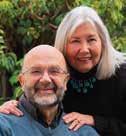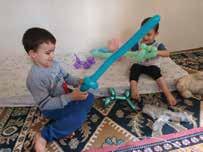PEACE IN THE STORM
Safe in God’s hands
You Train for It
Keys for finding peace Signs of the Times
The second coming of Jesus
The Power of Joy Therapy
Laughter heals

CHANGE YOUR LIFE. CHANGE YOUR WORLD.
Vol 25 • Issue 4


PERSONALLY SPEAKING is finding peace possible?
The famous Russian playwright Anton Chekhov once wrote: “We shall find peace. We shall hear angels. We shall see the sky sparkling with diamonds.” That’s a magnificent idea, but is it just wishful thinking? With such upheaval and conflict in the world today, we are likely to ask if there is any hope of finding peace, both in the social sphere and in our inner being.
The good news is that even where chaos reigns, there is a way to find peace. True, it won’t come without effort. We must align ourselves with God’s truth and will, but if we do our part, He promises to give us peace. As the Spanish saying goes, “As much as peace may cost, it’s never expensive.” This encourages us to seek peace regardless of the cost. It is worth it! In her article on page three, Marie Alvero shows us that to attain peace, as with anything else, we must train for it—through prayer, reading God’s Word, and putting our faith into action. That is true for finding inner peace as well as peace with our fellow man.
When we seek God, it is possible to have peace that surpasses our understanding (Philippians 4:7), and His peace is not contingent on external circumstances. In fact, God can make all things work together for good for those who love Him (Romans 8:28). He is all-powerful and He can cause even a tragedy to become a triumph.
God can give us the peace we long for; peace is part of His very essence. He can shine His peace into our hearts, enabling us to reflect His light to others who are searching for tranquility. You may not be a public figure or have influential means to promote peace, but all of us, from the lowliest to the loftiest, can first find peace of heart and mind through Jesus, the Prince of Peace, and then work to bring peace to others through our kind words and loving actions.
It is amazing to see that peace can even be found in places where disasters have struck. Be sure to read about the joy and fun therapy used by John Patrick and his team after the Türkiye earthquake, and the unexpected faith and serenity that Simon Bishop discovered in some of the victims of a devastating typhoon in the Philippines.
May you, too, find peace even in the midst of chaos.
Gabriel and Sally García Activated Editorial Team
For more information on Activated , visit our website or write to us.
Website: activated.org
Email: activated@activated.org
Local contacts:
South Africa:
Email: activated@helpinghandsa.org
India:
Email: activatedindia@activated.org
Nigeria:
Cell: +234 (0) 7036963333
Email: activatednigeria@activated.org
Philippines:
Cell: (0922) 8191142
Email: activated.phils@gmail.com
© 2024 Activated. All Rights Reserved. Designed by Gentian Suçi.
All scripture quotations, unless otherwise indicated, are taken from the English Standard Version (ESV). Copyright © 2001 by Good News Publishers. Used by permission. New International Version (NIV). Copyright © 1978, 1984, 2011 by International Bible Society. Used by permission. New King James Version® (NKJV). Copyright © 1982 by Thomas Nelson. Used by permission. King James Version (KJV). Public domain.
Vol 25, Issue 4
2
YOU FOR IT
TRAIN

It is always amazing when someone has peace in a truly trying situation. I think sports provides a good analogy for how that can happen. You train for it.
I’m not a big sports gal. I don’t care much for the Olympics. But I enjoy watching the figure skaters and gymnasts. Seeing the strength, precision, and grace they display as they execute every move leaves me in awe. When I was young, after being drawn in by an amazing performance, I tried a few of the moves. You probably can guess that it did not go well, as was evidenced by the bruises I got and the laughter of my sisters.
One of my favorite movies as a kid was the story of Nadia Comaneci, the first gymnast to receive a perfect score in the 1976 Olympics in Montreal. The movie shows her long journey, the work and discipline it took for her to make history in those few minutes on the mat. When other kids were playing, or doing just about anything else, she was in the gym practicing. While other kids ate whatever they wanted, she ate carefully calculated calories. Everything she did was in focused effort to get to be the best gymnast in the world. Nadia was an Olympic athlete and gymnast every day, not just on the one day that mattered.
By Marie Alvero
And this brings me to my point. Whatever it is you want to be or accomplish, you have to train for it every day. Philippians 4:6–7 says: “Do not be anxious about anything, but in every situation, by prayer and petition, with thanksgiving, present your requests to God. And the peace of God, which transcends all understanding, will guard your hearts and your minds in Christ Jesus” (NIV).
If you want the peace that transcends understanding, you need to take all your concerns to Jesus in prayer, with thanksgiving. If you establish this practice with the everyday little things, it will be your practice with the bigger things as well, and you will experience the peace of God. Conversely, if you don’t develop this habit in everyday situations, it is unlikely that it will be your reaction in the more challenging situations you face.
Just as I did not become a gymnast from watching someone else perform for a few minutes, you don’t grow in the area of not being anxious if you don’t train yourself every day to thank God, seek Him in prayer, and accept His supernatural peace.
Marie Alvero is a former missionary to Africa and Mexico. She currently lives a happy, busy life with her husband and children in Central Texas, USA. ■
3

The times we are living in are unprecedented in many ways, due to modern technology, the mass migration of people, and globalization on many fronts. Modern life often leads to people feeling isolated, adrift, or without a clear moral compass in ways that other generations didn’t experience to the same extent. We are witnessing struggles related to racism, discrimination, and bias; questions about authority and violence; corruption in high places, and concerns about the future
SIGNS OF THE TIMES
By Peter Amsterdam
health and sustainability of the planet. We certainly are living in troublous times in many ways.
Of course, every generation has experienced its own unique set of challenges, struggles, and growing pains. If we look through history, we can see this constant pattern. This is not surprising to Christians, as we know that we live in a fallen world and that sin is a reality that must be confronted in every generation, as it is manifested in the evils of poverty, oppression, war, and inhumanity. We are
4

not surprised by world conditions, as we know what the cause is: humanity’s broken relationship with God and the effects of that brokenness.
As Christians, however, our ultimate hope isn’t in this world or its political systems, as we know these are temporal and will pass away. We count ourselves amongst those described in Hebrews who have no lasting city on this earth, but desire “a better country, that is, a heavenly one” (Hebrews 11:16). We eagerly look forward to Jesus’
Second Coming, when all the pain, suffering, evils, and injustice will be made right and “the earth will be filled with the knowledge of the Lord as the waters cover the sea” (Isaiah 11:9). Nearly 2,000 years have passed since John wrote at the end of the book of Revelation, “Amen. Come, Lord Jesus!” and believers have wholeheartedly echoed this sentiment since then, and we continue to do so today.
Many Christians in recent times—as they have in times past—have sought to understand the relevance of current events and contemporary culture as they relate to the timetable for Jesus’ return. Are current world conditions—including modern technology, globalization, the widespread preaching of the gospel, the move to cashless economies and worldwide digital currencies—signs that we are entering the final seven years that will precede the Second Coming of Jesus Christ? How are we to interpret current events in light of their relevance to what the Bible teaches about this momentous period of world history, and what conclusions can we draw?
The answers to such questions are to be drawn first and foremost from Scripture and what the Bible cumulatively teaches us about the period immediately leading up to Jesus’ Second Coming. Of course, the exact details of how these events will play out are not as detailed as we would like, but the Bible does provide a clear outline of what we can expect to see, collectively referred to as “the signs of the times.” Let’s review some of these.
Signs of Jesus’ coming
When Jesus’ disciples asked Him: “What will be the sign of your coming and of the end of the age?” (Matthew 24:3), Jesus replied: “You will hear of wars and rumors of wars. See that you are not alarmed, for this must take place, but the end is not yet. For nation will rise against nation, and kingdom against kingdom, and there will be famines and earthquakes in various places. All these are but the beginning of the birth pains” (Matthew 24:6–8). The version in the Gospel of Luke includes pestilences in this list (Luke 21:11).
As we look through history, we can see that this “beginning of birth pains” has been occurring since the time of Jesus, referred to in the Bible as the “last days” to describe the period of time between Jesus’ first and second coming (1 John 2:18). There have been wars and rumors
5

of wars, though in some periods of history much more so than today. There have been, and continue to be, famines, pestilences, and earthquakes. Jesus referred to these as being only the beginning of sorrows (Matthew 24:8 NKJV).
However, the Bible describes some clear signs that we will see and that will allow us to know that the end is “at the very gates” (Matthew 24:33). Among other things, the Bible tells us that we will see the following signs before the Second Coming of Jesus:
• Lawlessness will increase and the love of many will grow cold (Matthew 24:12).
• The gospel will be preached in all the world for a witness to all nations (Matthew 24:14).
• There will come a great falling away (or rebellion) from God (2 Thessalonians 2:3 NKJV).
• The Antichrist and his powerful empire will rise (2 Thessalonians 2:3–9).
• The institution of the Antichrist government’s “mark of the beast,” without which no one will be able to buy or sell (Revelation 13:16–18).
• The great tribulation and persecution of Christians for three and a half years (Matthew 24:21–22).
When attempting to discern whether we are seeing the signs of the times being fulfilled in our lifetime, it is also important to bear in mind that they are a collection of events, not a single event. As Jesus explained: “When you see all these things, know that it is near—at the doors!” (Matthew 24:33 NKJV).
Always prepared
There is no question that every day that passes brings the world closer to Jesus’ return. As Christians, we await this triumphant event with eager anticipation, and we want to be prepared for it. Will we experience His Second Coming in our lifetimes? We can’t know that until we see the fulfillment of the definitive signs Jesus and others gave us in the Bible.
I know of nothing which I would choose to have as the subject of my ambition for life than to be kept faithful to my God till death, still to be a soul winner, still to be a true herald of the cross, and testify the name of Jesus to the last hour.
—Charles Spurgeon
What kind of preparation should we be concerned with as followers of Jesus? After describing in Matthew 24 what His followers will face during those final days, Jesus goes on to say: “Therefore you also must be ready, for the Son of Man is coming at an hour you do not expect.” And Jesus, as if in answer to their unspoken question of how to live in that state of constant readiness, goes on to say:
“Who then is the faithful and wise servant, whom his master has set over his household, to give them their food at the proper time? Blessed is that servant whom his master will find so doing when he comes. Truly, I say to you, he will set him over all his possessions” (Matthew 24:45–47).
Jesus refocuses the conversation on faithfulness with this reference to the faithful and wise servant, who has been given a responsibility for the master’s household and performs his job diligently. He doesn’t know when his master is going to return, but that doesn’t sway him; he is focused on being faithful in his work. When the master returns, that servant will be blessed.
Whether or not we will personally live to see the final seven years of world history in our lifetime, how we live our lives during the time God gives us on earth is what ultimately counts. As Christians, we are called to love God, love others, share the gospel, and do our best to live the teachings of Jesus. If we are faithful to do these things, we can trust that we will be prepared for whatever comes.
May we be faithful to pattern our lives according to God’s Word, to follow Him closely, and to share the good news of salvation through faith in Jesus Christ with as many people as we can.
Peter Amsterdam and his wife, Maria Fontaine, are directors of the Family International, a Christian community of faith. Adapted from the original article. ■
6
After a busy day of work, my colleague and I had one last stop. We loaded our van with educational materials and headed to drop them off at a little library. This library is situated in a very bad area, and while it is only a shipping container with makeshift shelves, it provides a safe environment for children to study. It’s an amazing project.

PEACE IN THE STORM
By Amy Joy Mizrany
An important aspect of the library is that it’s placed right in between two gang areas. This means that the children aren’t harassed for stepping onto someone’s “turf” while on their way to study.
After we drove there, we parked on the side of the road and waited for the man who runs the library to arrive. We chatted and listened to music. After a while, we noticed that quite a few people had gathered on the street. They were looking at us with puzzled expressions.
We didn’t think anything of it; we just nodded at anyone who made eye contact and kept waiting. Eventually those people wandered away, and the man we were waiting for arrived.
As we began to unload the books, he asked us if we had noticed more people around than usual. When we answered that we had, he told us: “The two gangs were gathering to have a fight, but when they saw you there, out of respect for what we do, they decided to wait until another time.”
I was speechless, trying to grasp how close a call we’d experienced. We drove home almost in silence. I turned to my partner and exclaimed how we had felt such peace, we hadn’t had a moment of fear the entire time. As we listened to music and talked, we were unaware of the danger brewing around us.
This reminded me of a poster I had as a child. It depicted a family sitting in their home enjoying a meal while outside a storm was raging. Around the house, two hands were cradling the family, providing peace in the midst of the storm.
When we say with the psalmist “Preserve me, O God, for in you I take refuge” (Psalm 16:1), we can be certain that He will. Every day He guides me, and I have no way of knowing the dangers and distress He saves me from. Regardless of whether I can see the threat or not, He can grant me safety and peace of mind wherever I am.
Amy Joy Mizrany was born and lives in South Africa, where she is a full-time missionary with Helping Hand and a member of the Family International. In her spare time, she plays the violin. ■


7
THE
POWEROFJOY THERAPY
By John Patrick

Truly, “the joy of the Lord is your strength,” and not only can it provide healing for your own personal sorrows, but it can bring great benefits to those you interact with. Joy can be a powerful force to help turn situations around. It may not be a 100% antidote to a person’s depression or a child’s sadness, but it can be the jump start that they need.
I spend a lot of time with children who have cancer. To stay positive despite the death and suffering I often see, I try to spend enjoyable moments playing games with the children in our care. It benefits both me and them. Such is the power of having fun with others; it helps us feel alive, and for the children with cancer, it truly can alleviate some of the pain they are suffering.
Recently, I met a family from Antakya (biblical Antioch). The mother and her three young boys had moved to our city as they had lost everything in the earthquake that left over a million and a half people
homeless. The earthquake was the disaster that broke the back of this family.
The family originally lived in Syria, where they were displaced multiple times. Due to the ongoing civil war and relentless bombings, they were forced to relocate to Türkiye, where they were renting an apartment. Slowly, over the years, their lives started to improve. The father had a steady job. They were happy in their little apartment in Antakya. They did not have a lot, but they had each other.
All they had built up over the years in Türkiye came crumbling to the ground when a killer earthquake with a 7.8 magnitude tore apart the region on the morning of February 6th, 2023. Everything they owned was demolished in the 80-second quake that seemed to last an eternity. They were trapped under the rubble of their five-story apartment building, where they spent the next two days freezing, thirsty, and hungry, while waiting for
8


an aid team to come to their rescue. Worse than their pain were the moans and screams of hundreds of people in their own and neighboring buildings who were either bleeding to death or whose limbs were crushed under the heavy cement structure of the building.
Overall, this family was fortunate. The father had to be hospitalized, but the mother and three children came out with only minor injuries. The father was later released from the hospital, but sadly the cumulative stress of war and disasters had a negative effect on him. He did not have the resolve to start all over again and ended up abandoning his wife and children.
The mother and her three children rented a hovel in a filthy, crowded slum of our city. Their living quarters consisted of a small entrance room, one bedroom, and a kitchen and bathroom that had water leaking from the flat above. The dimly lit house was moldy, with bare cement floors. The kids sat on a thin mat in the entrance room. The oldest boy, age five, had not spoken a word in the four months since the earthquake.
We gave donated food supplies to the mother and pledged to raise funds for her to rent a new and better place. A visiting aid worker from Albania was working with us. He had some balloons and began making balloon swords for the children. In a matter of minutes, we were in another world, lovingly dueling with each other and the children with our colorful balloon swords. Even the older boy entered in, and we noticed a slight smile would briefly adorn his face.
That night I couldn’t sleep, thinking about those three boys. I felt we could help the older boy speak again if we could spend more time with him. Perhaps a little fun time “acting out” would provide an appropriate coping mechanism that would benefit him.
The next day, we visited this family again, with a plan to spend quality time with the children. After bringing some gifts for the kids, we again engaged in a hearty game of sword-fighting with our scimitars made from colorful balloons. When the oldest boy would hit us with his
Discovering more joy does not, I’m sorry to say, save us from the inevitability of hardship and heartbreaks. In fact, we may cry more easily, but we will laugh more easily, too. Perhaps we are just more alive. Yet as we discover more joy, we can face suffering in a way that ennobles rather than embitters. We have hardship without becoming hard. We have heartbreak without being broken.
Desmond Tutu
The greatest source of lasting joy is to know Jesus Christ as your savior. You can open your heart to Him by praying this simple prayer: Dear Jesus, please forgive me for my sins. I believe that You died for me. I invite You into my life. Please fill me with Your love and Holy Spirit. Help me to love You and others and live by the truth in the Bible. Amen.
sword, we would fall over dramatically, or howl as if he hurt us. Within minutes he was laughing again, and in a mere twenty minutes he was chattering away with his brother in this magical world of imagination and fun. The mother was elated; this was the first time her son had spoken in four months!
After a few more games and a round of delicious local coffee, it was time to go. We all left overjoyed to see this five-year-old boy brought back to life by the healing effects of fun and joy therapy!
John Patrick is a humanitarian aid worker, teacher, and author who has served in Muslim countries for over four decades. He currently assists in humanitarian aid programs in the Middle East and Africa. ■


9
WORSHIP WITH ABANDON
By Ruth McKeague

When my husband and I first started to attend the church we now call “home,” we couldn’t help but notice Jack. A man in his fifties at the time, he was clearly someone who had suffered. It was evident in his labored walk, his slow speech, his slightly bent posture. The striking thing about Jack, though, was not the stamp of suffering he bore, but the sheer joy he exuded.
Our church is a congregation of believers who are in many ways typically Canadian. We are pleasant, polite,
and quietly reserved through our Sunday services—except for Jack. Always sitting near the front of the congregation due to issues with his hearing, Jack worships with abandon. Hands outstretched, eyes uplifted, he sings out hymns and songs of worship, personally moved by every word. During a sermon, Jack will proclaim “Amen!” in an otherwise silent sanctuary. Sometimes after the service, Jack will share a Bible verse in response to the message.
Entirely present, filled to overflowing with the Holy Spirit, and utterly joyful, Jack embodies the words in
10
Hebrews 13:15: “Through Jesus, therefore, let us continually offer to God a sacrifice of praise—the fruit of lips that openly profess his name” (NIV).
In time, we learned Jack’s story.
In the early hours of December 25, 1979, 20-year-old Jack was walking home from a party. He had decided it was safer to walk considering the alcohol he had consumed. A friend of his, who had been at the same party and who had also consumed a lot of alcohol, chose to drive home. In a tragic coincidence on that journey home, his friend came off the highway and rushed through a yellow light to turn left, and maintaining his high speed after he’d made the turn, he hit Jack, who was crossing the road.
“And then, BANG!” Jack describes it. “I’m thrown 60 feet into the air.” Jack landed headfirst on the pavement and was in a coma for four months. The first doctor who treated him said that he would likely never come out of the coma, and that if he did, he would never walk or talk again. “But you know what?” Jack says, “Because we have a miracle-working God, you can’t slow me down, and you cannot shut me up!” When Jack came out of his coma April 8, 1980, he was moved out of the hospital to a rehabilitation center where, for another four months, he learned how to walk, talk, dress himself, and feed himself.
it with them. “I hadn’t heard that song since I was eight years old,” he says, “but I knew the words.” Jack asked the youth pastor when the Sunday service would be held. And for the first time in decades, Jack went to church that Sunday.
The pastor was preaching a message on salvation, based on 1 John chapter 5. Verse 12 changed Jack’s life.
“When the pastor spoke the words, ‘He who has the Son has life,’ it was like a bolt of lightning hit my heart.” Jack hits his chest to illustrate the impact he experienced. “And I knew that I was changed. I knew that I was born again, that He touched me!” He pauses and then again pounds his chest, trying to express what his words cannot. His eyes sparkle, and his smile lights up—outshining all evidence of pain, injury, and loss—as he quotes the words to the song, “Because He lives, I can face tomorrow. Because He lives, all fear is gone … and life is worth living just because He lives.”

When he finally went back home, Jack says, “I resumed the same way of life: Party! Party! Party!” His near-death experience gave him plenty of stories to share in bars and other settings where alcohol flowed freely. In December of 1992, he was in a bar, sharing his story with an attractive female bartender who happened to be a Christian. After hearing about Jack’s harrowing accident and incredible survival, she invited him to a youth group meeting. Taken aback, the now-33-year-old Jack accepted her invitation.
At the meeting, the young people sang “Jesus Loves Me,” and Jack was surprised to find that he could sing
Despite his struggles, I catch myself coveting what Jack has. “But covet earnestly the best gifts …” said the Apostle Paul in 1 Corinthians 12:31 (KJV), just before he penned the famous lines about the nature of love in 1 Corinthians 13. In accordance with the words of the apostle, Jack’s heart “rejoices with the truth” (13:6) of God’s love extended to him. It rejoices with the gift of salvation that he received, and the abundant life that he has found in knowing Jesus. Surely, Jack’s joy is among “the best gifts.”
I’m not the only one who is inspired by Jack. He says that many people tell him that they appreciate his openness. I suspect that Jack’s example gives them a certain freedom, as it does for me. It encourages each of us to give ourselves permission to shake off the restraints of polite reserve, to allow our own longing for God to break through the surface, and to worship with abandon.
Ruth McKeague is a retired teacher and lives in Ottawa, Canada. ■
11
Jack

FAITH AMIDST TRAGEDY
By Simon Bishop
The Philippines is often hit by typhoons and other natural disasters. Sometimes these cause great damage and loss of life. About 12 years ago a typhoon hit a city in the southern island of Mindanao, causing a flash flood. A sudden rush of water swept away hundreds of houses of poor settlers who had their makeshift dwellings along the lower banks of the river. Thousands of people were swept away, as this happened in the middle of the night. Some people were rescued miles away, and others were washed ashore on an island far out to sea. Over 1,000 people died.
This was around Christmastime, and I was in the midst of many planned and scheduled activities to help the needy. Nevertheless, a few days after the new year I found myself wondering how I could help. I had no funds set aside, and I wondered whether it would be worth the trip to that island if I did not have many resources to give.
I felt God speaking to my heart, and I thought, If I had just lost loved ones, what would I be most in need of?
12

Probably more than relief supplies or food, I would want someone to comfort me, someone I could talk to or cry with. My mission partner and I went ahead and planned to travel down to that area, and thanks to many generous donations given by friends when they heard about our trip, we were able to distribute a lot of food and relief items. However, as I had thought, people were the most thankful for the time we spent with each person or family who had experienced loss.
On our third day there, we went to a shelter where we met a man who was disabled. His feet were deformed and he was only about four feet tall. He said that he had traveled from another island years ago to meet the woman who would become his wife. Later they had two children. But his wife and children had been lost in the flood, and he was alone again. I began to cry when hearing his story. He went on to say that he would probably return to his hometown as there was nothing left to keep him where he was. He explained that, although he had nothing left,
he still clung to his faith in God. He said he believed in heaven and that he would see his loved ones again one day.
This faith and continued belief in God became a theme that I heard over and over from those we talked with during our time there. It was hard for me to understand. How could these people who had just experienced the loss of what little they had, as well as the death of their loved ones, continue to manifest so much faith and trust in God? I thought about this a lot in the days following, comparing my own somewhat fair-weather faith to what I had seen and heard in this community.
Here are some of my thoughts: My somewhat easy and comfortable life is not what gives me faith. In fact, my expectation that things should always be quite easy and abundant often causes me to easily lose my equilibrium and feel anxious, sometimes to the point that doubts become stronger in my mind than my faith. In contrast, these people who experience poverty and hardship on a daily basis have a more sure foundation for their faith. They have faith in the sovereignty of God, in who God is. Their faith isn’t based on what God did or didn’t do for them, or if they think He is being fair to them. I would say that this is a much firmer foundation for faith to be built on.
These days I am trying—and sometimes succeeding— to build a stronger faith, to remember that God does have my best interests at heart, but that it is not my place to judge Him or decide if I think He is doing a good job. Rather, my place is to trust in Him and to grow my faith by spending time with Him through prayer and reading His Word, the Bible.
I hope that one day I can say along with the three Hebrew men whom the Babylonian king threatened to cast into a fiery furnace if they refused to bow down to his golden idol: “If we are thrown into the blazing furnace, the God we serve is able to deliver us from it, and he will deliver us from Your Majesty’s hand. But even if he does not, we want you to know, Your Majesty, that we will not serve your gods or worship the image of gold you have set up” (Daniel 3:17–18 NIV). In other words, our faith is in God, whether He does what we hope He will do or not. We know He can, but we leave our fate in His hands.
Simon Bishop does full-time mission and humanitarian work in the Philippines. ■
13
CRISIS MANAGEMENT

There is a way to remain hopeful even in the midst of crises. As we read and absorb God’s Word, our faith and trust in His care for us grow. (See Romans 10:17; Psalm 18:30.)
Ask God for help.
When the righteous cry for help, the Lord hears and delivers them out of all their troubles.—Psalm 34:17
In the day of my trouble I call upon you, for you answer me.—Psalm 86:7
Let us then with confidence draw near to the throne of grace, that we may receive mercy and find grace to help in time of need.—Hebrews 4:16
Meditate on God’s promises.
The steadfast love of the Lord is from everlasting to everlasting on those who ... remember to do his commandments.—Psalm 103:17–18
You are my hiding place and my shield; I hope in your word.—Psalm 119:114
Whatever things were written before were written for our learning, that we through the patience and comfort of the Scriptures might have hope.—Romans 15:4 NKJV
Trust God to resolve the problem.
Trust in the Lord with all your heart, and do not lean on your own understanding. In all your ways
acknowledge him, and he will make straight your paths.—Proverbs 3:5–6
Those who know your name put their trust in you, for you, O Lord, have not forsaken those who seek you.—Psalm 9:10
Do not throw away your confidence; it will be richly rewarded. You need to persevere so that when you have done the will of God, you will receive what he has promised.—Hebrews 10:35–36 NIV
Remind yourself of God’s goodness and faithfulness.
The mountains may depart and the hills be removed, but my steadfast love shall not depart from you.—Isaiah 54:10
We know that for those who love God all things work together for good.—Romans 8:28
I am sure of this, that he who began a good work in you will bring it to completion—Philippians 1:6
Thank Him for answering your prayers.
Oh give thanks to the Lord, for he is good, for his steadfast love endures forever!—Psalm 107:1
Do not be anxious about anything, but in everything by prayer and supplication with thanksgiving let your requests be made known to God. And the peace of God, which surpasses all understanding, will guard your hearts and your minds in Christ Jesus.—Philippians 4:6–7 ■
Feeding Reading
14
HELP FOR THE HARD DAYS
 By Joyce Suttin
By Joyce Suttin
I have been so irritable lately. Things that normally would just flow over me seem to hover like a foreboding dark cloud. I wanted to be alone in my room to lament the myriad of offenses that were plaguing me. I was hiding, but I was also lonely, wishing someone would see through my façade of pleasantries. I was hoping for someone who would listen while I bared my pent-up soul.
Eventually, things came to a head, and I blew up at an innocent person. It wasn’t my two-year-old granddaughter. I always have lots of patience with her. It also wasn’t the unhappy, angry person who had offended me. Unfortunately, someone who had good intentions received my undeserved criticism when they asked about what was bothering me.
Later I took a prayer walk and then went to bed, asking the Lord to forgive me and help me through this
hard time. The next morning, as I read some devotionals, the first lines spoke to my heart and touched me in a way that changed me.
Lord, make me an instrument of Your peace. Where there is hatred, let me sow love; where there is injury, pardon; where there is doubt, faith; where there is despair, hope; where there is darkness, light; where there is sadness, joy.
O Divine Master, grant that I may not seek to be consoled as to console; to be understood as to understand; to be loved as to love. For it is in giving that we receive; it is in pardoning that we are pardoned; it is in dying that we are born again to eternal life.—Attributed to Saint Francis of Assisi
Those beautiful words comforted my troubled heart and healed me, and challenged me to do better, to be better, to take those offenses and turn them into compassion for all those who were feeling how I felt and struggling through hard days. I had felt judgmental toward a person who had criticized me when I was trying to be helpful. But then I clearly saw how much I needed pardon for hurting someone who had been trying to help me.
That day I was still cordial, but it came from a heart that had been set right. I still used pleasantries, but they were genuine. Most of all, I felt the deep peace of knowing that the Lord would help me through even the hardest days as I prayed that simple prayer.
Joyce Suttin is a retired teacher and writer and lives in San Antonio, USA. Check out her blog at joy4dailydevotionals.blogspot.com ■
15
From Jesus with Love
From Everlasting to Everlasting

I have loved you from everlasting to everlasting, so great is My love for you (Psalm 103:17)! I have implanted My love and Spirit deep in your heart so that you might find strength, faith, and hope to sustain you on your journey through life.
When you feel alone or you have fallen on hard times, come to Me and you will find peace in My presence. When you are discouraged, look up into My face and see Me smile upon you with My unconditional love (Hebrews 13:5). When you feel worried or anxious about the state of the world and chaos appears to reign, bring all your cares to Me. Commit every problem and all the worries and the cares of life to Me, and you will find rest for your soul (Matthew 11:28–29).
When you feel weak, I will be your strength. When confusion is all around you, I will give you My peace that transcends all understanding (Philippians 4:7 NIV). When you feel fearful, I will comfort your heart. When you feel strain, I will bring relief.
When all around you seems dark and stormy, My Word will be a lamp to guide you and a light for your path (Psalm 119:105). When you feel lost, I am with you to remind you that you have already been found for all eternity. You are Mine forever, and nothing will ever be able to separate you from My love (Romans 8:38–39).





















 By Joyce Suttin
By Joyce Suttin
